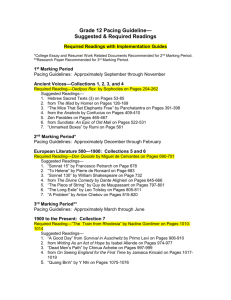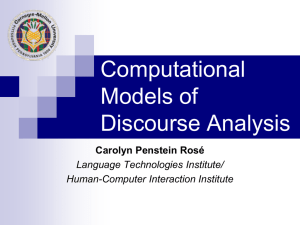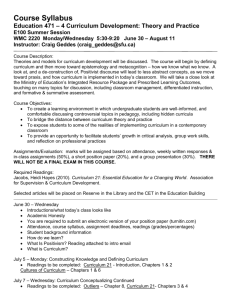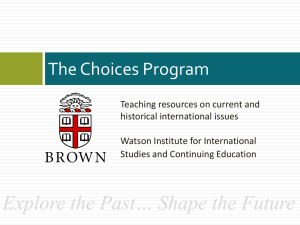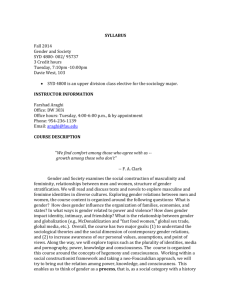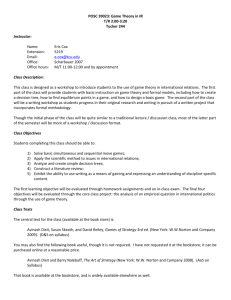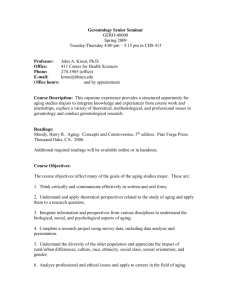ADED 565b: PERSPECTIVES ON PROGRAM EVALUATION
advertisement
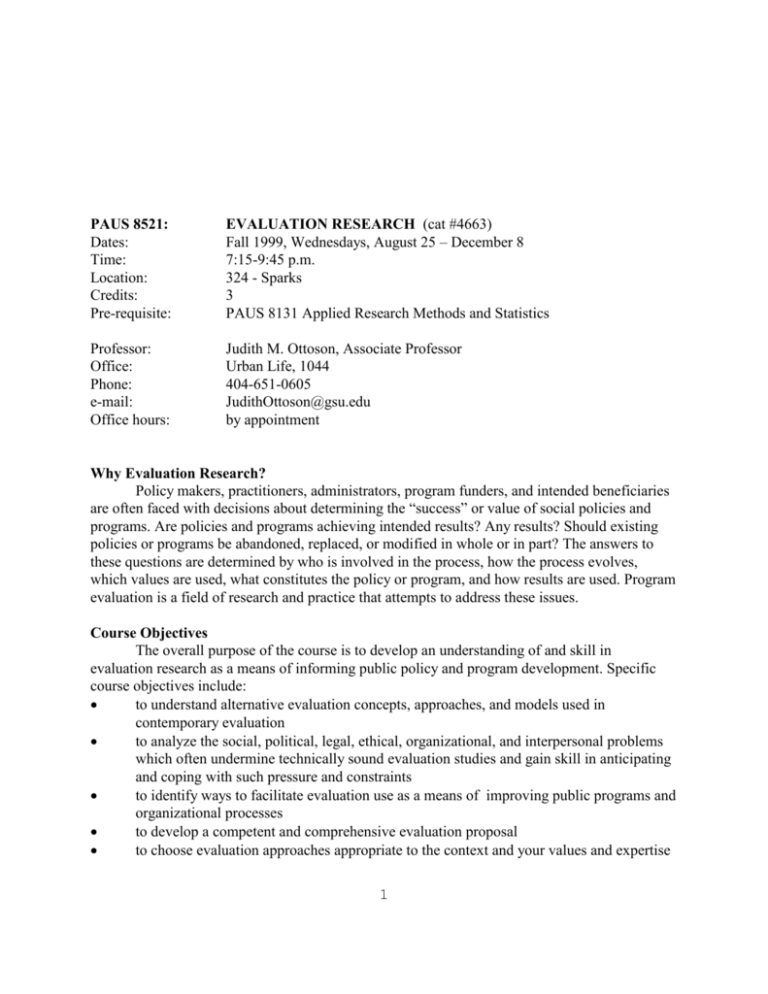
PAUS 8521: Dates: Time: Location: Credits: Pre-requisite: EVALUATION RESEARCH (cat #4663) Fall 1999, Wednesdays, August 25 – December 8 7:15-9:45 p.m. 324 - Sparks 3 PAUS 8131 Applied Research Methods and Statistics Professor: Office: Phone: e-mail: Office hours: Judith M. Ottoson, Associate Professor Urban Life, 1044 404-651-0605 JudithOttoson@gsu.edu by appointment Why Evaluation Research? Policy makers, practitioners, administrators, program funders, and intended beneficiaries are often faced with decisions about determining the “success” or value of social policies and programs. Are policies and programs achieving intended results? Any results? Should existing policies or programs be abandoned, replaced, or modified in whole or in part? The answers to these questions are determined by who is involved in the process, how the process evolves, which values are used, what constitutes the policy or program, and how results are used. Program evaluation is a field of research and practice that attempts to address these issues. Course Objectives The overall purpose of the course is to develop an understanding of and skill in evaluation research as a means of informing public policy and program development. Specific course objectives include: to understand alternative evaluation concepts, approaches, and models used in contemporary evaluation to analyze the social, political, legal, ethical, organizational, and interpersonal problems which often undermine technically sound evaluation studies and gain skill in anticipating and coping with such pressure and constraints to identify ways to facilitate evaluation use as a means of improving public programs and organizational processes to develop a competent and comprehensive evaluation proposal to choose evaluation approaches appropriate to the context and your values and expertise 1 Course Approach Evaluation is understood to be a complex process of placing value on something. In this course, that something is a policy or program. This course combines theory and practice to explore the why, who, and when of evaluation as a determinate of the how. Rather than applying a one-theory-fits-all approach, the course begins with an overview of multiple perspectives on evaluation research and the standards for program evaluation. Following this foundation, we will work our way through the text to develop and apply an understanding of the evaluation research process. The knowledge gained from this work will be applied to case studies of evaluation practice and an educational policy or program of the student’s own choosing. Course Readings The following pages of this syllabus designate the required readings for each week. It is expected that students will complete all readings before each session so that the course can be conducted as a lively seminar. Required readings Course text: Weiss, C.H. (1998). Evaluation: Methods for studying programs and policies. (2nd ed.) Englewood Cliffs: Prentice-Hall. A packet of supplemental readings for weeks 2 -5 is available at The Print Shop by 9/1/99 A packet of supplemental readings for weeks 6-12 will be available at the Print Shop by 9/15/99 Recommended reading The Joint Committee on Standards for Educational Evaluation. (1994). The program evaluation standards (2nd ed.). Thousand Oaks: Sage. Course Assignments and Grading The course grade will be based on an exam, evaluation proposal, and class presentation. The following is a summary of the components of the course grade. More detail on assignments and grading are provided on page 7. Date September 22 September 29 October 6 November 10 Nov 17 or Dec 1 December 8 What Pre-proposal, 1 page Mid-term exam, 60" Proposal: part I, 8-10 pages Proposal: part II, 8-10 pages In-class presentation Final proposal: parts I, II, & III, 30 pages 2 % of grade Na 25% 15% 15% 5% 40% 100% Course Expectations It is expected that the course will be a collaborative learning process for all involved. You are encouraged to share your experiences and thinking about evaluation research and to encourage others to do the same. It is expected that you will attend all course sessions. If you cannot do so, it is expected that you will contact the professor prior to class and notify her by phone or e-mail of your absence. If you miss a class, you will be held responsible for the content and materials of that week. Please make arrangements with a fellow class member to acquire these. It is expected that the work you do in this class will be original and not plagiarised from another other source. You are responsible for understanding what plagiarism means. If in doubt, ask. Lastly, it is expected that you just might become interested in and skilled at doing evaluation research. Con cuidado! COURSE SCHEDULE, READINGS, AND ASSIGNMENTS SESSION 1: August 25, 1999 TOPICS: Overview - course intent, content, schedule, and assignments - interests and experiences in evaluation - current debates in evaluation research SESSION 2: September 1, 1999 TOPICS: multiple purposes and stakeholders - evaluation as research or evaluation vs research? - multiple purposes and stakeholders in evaluation READINGS: - Text Chapter 1: Setting the Scene, pp 1-19 - Text Chapter 2: Purposes of Evaluation, pp 20- 45 SESSION 3: September 8, 1999 TOPICS: evaluation theories - comparative framework - meanings of theory and connections to practice - theories of programming, valuing, utility, knowledge construction, and practice READINGS: - Shadish, W.R., Cook, T.D.,& Leviton, L.C. (1991). Good theory for social program evaluation. In Shadish, W.R., Cook, T.D.,& Leviton, L.C., The foundations of program evaluation, pp. 36-67. Newbury Park: Sage. - Ottoson, J.M., (in press) Evaluation of continuing professional education: Towards a theory of our own. New Directions in Adult and Continuing Education. Newbuy Park: Sage. 3 SESSION 4: September 15, 1999 TOPICS: multiple approaches to evaluation READINGS: - Posavac, E.J., & Carey, R.G. (1992). Planning and evaluation. In Posavac, E.J., & Carey, R.G. Program evaluation: Methods and case studies. (4th ed.). pp. 23- 27. - Stufflebeam, D.L., & Webster, W.J. (1983). An analysis of alternative approaches to evaluation. In Stufflebeam, D.L., & Webster, W.J. (eds). Evaluation models: Viewpoints on educational and human services evaluation. (pp 23-43). Boston: Kluwer-Nijhoff Publishing. - Patton, M.Q. (1997). Utilization-focused evaluation. Thousand Oaks: Sage, pp. 192194. SESSION 5: September 22, 1999 TOPICS: program evaluation standards - utility, feasibility, propriety, accuracy - trade-offs and application READING: - The Joint Committee on Standards for Educational Evaluation. (1994). The program evaluation standards (2nd ed.). Thousand Oaks: Sage, pp 1-20. - Summary of program evaluation standards ASSIGNMENT: pre-proposal due SESSION 6: September 29, 1999 TOPICS: focusing on what is being evaluated - “the evaluand:” policy, program or project - social problem intended to be ameliorated - social program theory READINGS: - Text Chapter 3: Understanding the Program, pp. 46-71 EXAM: mid- term exam at the beginning of class SESSION 7: October 6, 1999 TOPIC: planning the evaluation - evaluation questions - practical guidelines for practice - evaluator roles READINGS: - Text Chapter 4: Planning the Evaluation, pp. 72- 96 - Text Chapter 5: Roles for the evaluation, pp. 97 – 113. ASSIGNMENT: Part I of the evaluation proposal is due 4 SESSION 8: October 13, 1999 TOPIC: evaluation design – quantitative - developing measures - data collection - data analysis READINGS: - Text Chapter 8: Design of the Evaluation, pp. 180-214 - Text Chapter 6: Developing Measures, pp. 114-151 SESSION 9: October 20, 1999 TOPIC: evaluation design – qualitative - foreshadowed problems - data collection - data analysis READINGS: - Text Chapter 11: Qualitative Methods, pp. 252-270 - Le Compte, M.D. & Preissle, J. (1993). Summary Table. Ethnography and qualitative design in educational research. (2nd ed.). San Diego: Academic Press. - Text Chapter 7: Collecting Data, pp. 152-179 SESSION #10: October 27, 1999 TOPIC: evaluation design – mixed - informing measures with foreshadowed problems - data collection - data analysis READINGS: - Steckler, A.,McElroy, K.R., & Goodman, R.M. Bird ST | McCormick L (1992). Toward Integrating Qualitative and Quantitative Methods: An Introduction. Health Education Quarterly, 19(1), 1-8. - Reading to be determined SESSION #11: November 3, 1999 TOPIC: analysis and reporting - writing reports - disseminating results - evaluator stance toward utilization READINGS: - Text Chapter 12: Analyzing and Interpreting the Data, pp. 271- 293 - Text Chapter 13: Writing the Report and Disseminating Results, pp. 294-319 5 SESSION # 12: November 10, 1999 TOPIC: management and utilization of findings - practice of evaluation - managing the evaluation READINGS: - Text Chapter 14: Evaluating with integrity, pp 320-326 - Reading to be determined ASSIGNMENT: Part II of the evaluation proposal is due SESSION #13: November 17, 1999 ASSIGNMENTS: student presentations NO CLASS NOVEMBER 24, 1999: HAPPY THANKSGIVING SESSION #14: December 1, 1999 ASSIGNMENTS: student presentations SESSION #15: December 8, 1999 TOPIC: synthesis of course content - review of course content and process - revisting the evaluation debates: where do you stand ASSIGNMENT: final proposal (Parts I, II, and III) due 6 COURSE ASSIGNMENTS: ’99 The following assignmenst are intended to help you gain the knowledge and skill this course hopes to facilitate in evaluation research. Mid-term exam A 60 minute mid-term exam will explore your knowledge of the foundational material in evaluation research covered in the first five sessions of the course. Both closed-ended and essay questions will be used. The exam will be held in class on September 29th and count as 25% of the course grade. Grading will consider the accuracy of your answers, the depth of your understanding of concepts, your ability to apply ideas, the connection among ideas, and insight. Evaluation Proposal To apply your understanding of course content, you will be asked to develop a proposal to evaluate a policy or program of interest and relevance to you. It is best that you pick a policy or program in which you are, have been, or will be involved. In other words, pick something you know something about. On September 22nd, a one-page pre-proposal of the policy or program to be evaluated is due. The pre-proposal should describe the nature of the policy or program to be evaluated, your relationship to it, a ball park budget, and the inquiry approach anticipated. Instructor approval of the proposal is necessary before moving to other parts of the proposal. Part I of the proposal is due on October 6th. It is expected that this paper will be approximately 8-10 pages in length. The work in this paper lays the foundation for subsequent parts of the proposal. Part I should contain the following elements based on the materials covered in the course to date: purposes of the evaluation - who wants the evaluation and why? Include an identification of stakeholders and their interests, like uses of the evaluation, kind of evaluation (formative vs summative), and your position in the process. description of the policy or program - what are the relevant characteristics of the policy or program to be evaluated, including the social problem intended for amelioration. What is the program "theory?" What services are offered? by whom? for whom? budget- What is the approximate overall budget for the evaluation? (no details, just the parameters for funding) Who funds the program? Who funds the evaluation? Part II of the proposal is due on November 10rd. It is expected that this paper will be approximately 8-10 pages in length and build on the work initiated in Part I. This part focuses on evaluation design and data collection. It should contain the following elements based on materials covered in the course to date: evaluation questions – What are the key questions for the study? 7 family of inquiry- Which family (families) of inquiry will be used to meet the purposes of the evaluation and answer the questions posed? Defend your choice for its appropriateness and feasibility. data – If this is a quantitative study, which measures will be used? If this is a qualitative study, what will guide data collection? data collection – From what sources, sites, and/or samples will data be collected? How will it be collected? How will the quality of the data be assured? data analysis – What approaches will be used to analyze the data? Justify these decisions in light of the evaluation purpose and questions? Final proposal and Part III are due on the last day of class, December 8.th It is expected that this final paper will be build on and include Parts I and II (they will count for 20 of the 30 pages expected.) It will also contain Part III, which is intended to analyze and summarize the proposal. Part III should be 10 pages in length. The final paper should include the following: Parts I and II of the proposal should be resubmitted after having been strengthened by the professor’s previous review, class feedback during your presentation, and your increased understanding of the topic and issues. Make changes as necessary to strengthen these sections. It is critical that you include a summary sheet to highlight changes made in these parts. Part III of the final proposal should build on final sessions of the course and include - time line – What is the overall time line for the evaluation? What is the time line for specific components of the evaluation? - budget- Provide a budget of sufficient detail to show expenses for personnel, materials, travel, and other major items - reporting and dissemination – What form will the report(s) take? How will results be disseminated? - evaluation standards – Critically analyze your own proposal using the standards for program evaluation. Describe how this evaluation has taken into consideration the standards for program evaluation, including accuracy, propriety, feasibility, and utilization. What kind of trade-offs were necessary to complete the final evaluation proposal? Grading of Parts I and II of the proposal will consider the inclusion (at a minimum) of the components requested, the clarity of your presentation, the connection among the components and parts, the use of ideas from the readings and class discussion, and insights applicable to your own circumstances. Grading of the final proposal will look for evidence of learning in revisions to Parts I and II, the connection of part III to the preceding parts, the quality and clarity of the writing and presentation of ideas, the ability to think critically about your own proposal, and accuracy, feasibility, propriety, and utility of the proposal. In-class presentation You will be asked to present your evaluation proposal – parts I and II – in-class on either November 17th or December 1st. It is anticipated that you will have approximately 30 minutes for 8 a presentation and discussion of your proposal. This will be an opportunity to get feedback on these parts before their inclusion in the final proposal. The grade will consider the completeness of your presentation, the ability to stimulate and respond to class suggestions, and coherency of the presentation. Grading Following the policies of GSU, straight letters grades will be given as follows. For more information on grades, see page 62 of the GSU Policy Studies Graduate Bulletin, 1999-2000. A B C D F W 90 – 100 80 – 89 70 – 79 60 – 69 59 or less Excellent Good Average Poor Failure Withdrawal Before 10/15/99) 9

